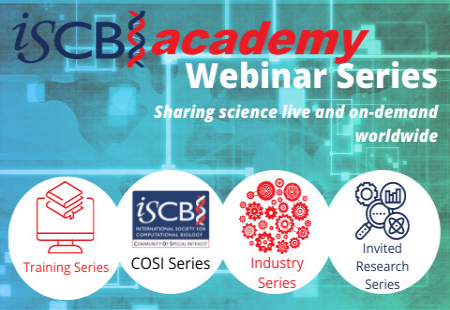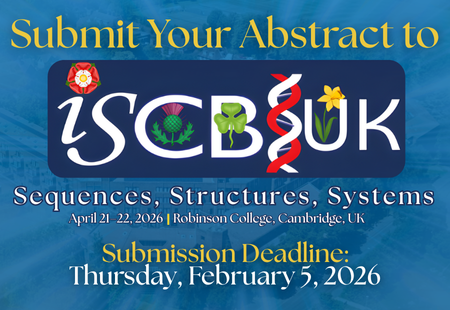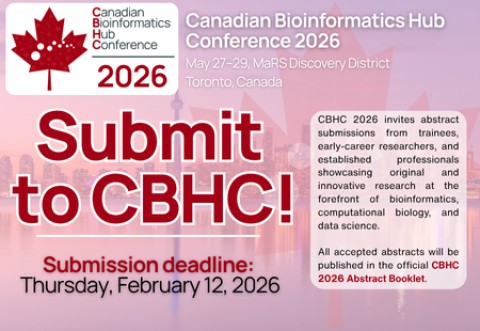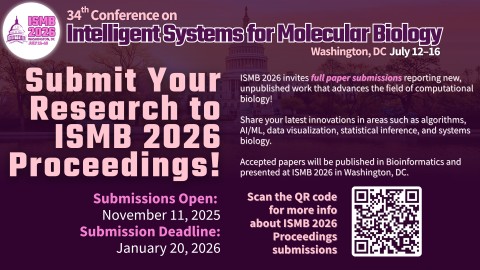CALL FOR POSTERS – ISMB 2018
Poster Chair: Casey Greene, University of Pennsylvania, Philadelphia, United States
Poster
Co-chair: Arjun Krishnan, Michigan State University, East Lansing, United States
Submit a Poster
ISMB 2018 invites all interested participants and conference attendees to consider presenting a poster.
General Information
Poster Fees Deadlines
Submission Guidelines
Posters on Display
Poster Display Size
Poster Topic Areas
FAQ
ISMB/ECCB 2017 will bring together scientists from a wide range of disciplines, including molecular biology, biology, medicine, computer science, mathematics and statistics. We are soliciting high-quality research posters on any aspect of computational and experimental biology. Your poster should be submitted to the category that most accurately reflects the area of the work as posters will be organized accordingly. Your poster must include original work that is unpublished or published after August 1, 2016. Your poster should convey a scientific result and should not be an advertisement for any commercial software package.
Posters advertising commercial software will be rejected from this poster session and/or removed from the conference without notice. There is a separate space for such posters in the exhibition area. If you have an industry poster, contact This email address is being protected from spambots. You need JavaScript enabled to view it. .
Poster Fees and Deadlines
ISCB Members:
* You are eligible to submit your poster at no charge during the early poster submission process (deadline May 15, 2017).
* You will be charged a $50 fee to submit your poster during the late poster submission process (deadline June 5, 2017).
Non-Members:
* You will be charged a $50 fee to submit your poster during the early poster submission process (deadline May 15, 2017).
* You will be charged a $100 fee to submit your poster poster during the late poster submission process (deadline June 5, 2017).
| Late Poster Deadlines | |
|---|---|
| Tuesday, May 16, 2017 | Call for Late Posters Opens |
| Monday, June 5, 2017 | Late Poster submission deadline |
| Monday, June 12, 2017 | Late Poster Acceptance Notification |
| Date | Description | Member Fee | Non-Member Fee |
|---|---|---|---|
| Monday, May 15, 2017 | Early Poster Submission Deadline | $0.00 | $50.00 |
| Monday, June 5, 2017 | Late Poster Submission Deadline | $50.00 | $100.00 |
Submission Guidelines
- If you submit your poster by May 15, 2017 deadline, you will be notified whether or not your poster has been accepted by May 31, 2017 and you may be eligible to apply for a Conference Travel Fellowship.
- All poster abstracts must be submitted using the conference submission site by the abstract deadline: May 15, 2017 (You have until 11:59 p.m. Eastern Time Zone).
- Your poster's abstract (maximum 250 words) will be posted on the conference web site. You do not need to submit a PDF of your poster.
- Your abstract must not contain your title/position or any personal information (e.g. affiliation).
- You may only be the presenting author for one poster.
- As the presenting author, you must be registered as a delegate and be available at the poster session to which your poster is assigned.
- Any author may submit to other conference tracks in addition to submitting a poster for review.
Posters on Display
The poster display schedule will be available by May 31, 2017 and will based on the COSI program schedule.
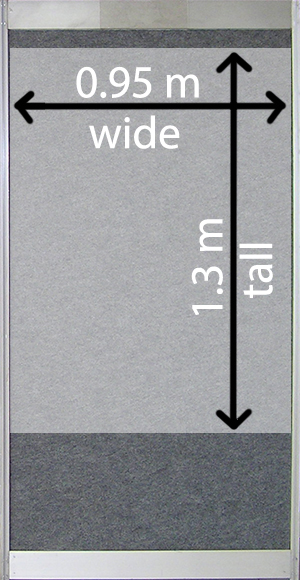 Attention Poster Authors:
Attention Poster Authors:
When preparing accepted posters please note that your poster should not exceed the following dimensions 0.95 m (wide) x 1.30 m (high)
View a diagram of the poster board in pdf format
here.
Submissions received after May 15, 2017 will be considered for the late poster acceptance. Posters submitted and accepted as part of the Call for Late Poster (opens May 16, 2017) are NOT eligible to apply for Conference Travel Fellowship Support.
top
The conference organizers will not offer tables for laptop computer demos during the poster session. If you would like to demonstrate your software, you are encouraged to submit an application for Technology Track. All abstracts will be considered a "personal communication" to the conference attendees. Abstracts will not be published in the proceedings, but will appear in the program and on the conference website.
Poster Topic Areas
When submitting posters, please note if more than one area is applicable,
please select the most relevant area. If two are equally relevant, please select one arbitrarily.
| Area (click for description) |
|---|
| Structural bioinformatics and computational biophysics (3Dsig)
3DSIG focuses on structural bioinformatics and computational biophysics. It is impossible to fully understand biological systems without understanding the 3D structure of their constituting parts and their interactions. As such the topics relevant for 3DSIG are wide and include, but are not restricted to Structure-based drug discovery including polypharmacology and network pharmacology; Structure representation, classification and prediction; Structure-based function prediction; Docking, analysis, prediction and simulation of biomolecular interactions such as protein-protein, protein-ligand and protein-nucleic-acid; Protein dynamics and disorder; Evolution studied through structures; Application of structure to systems biology; Macromolecular assemblies; Structural genomics; 3D databases and data mining; Molecular visualization; Relevant methods of structure determination particularly hybrid methods; Prediction and analysis of protein domains; Membrane protein structure analysis and prediction; The structural basis of immunology. Keywords: Drug-discovery; Structure representation/classification/prediction; Structural basis of macromolecular function; Prediction and simulation of biomolecular interactions; Dynamics of biological macromolecules; Evolution studied through structures; Structural systems biology/pharmacology; 3D visualisation/data mining/databases; Structure-based protein engineering; Structural basis of human diseases |
| Bioinformatics Open Source Conference (BOSC)
The Bioinformatics Open Source Conference (BOSC) is organized by the Open Bioinformatics Foundation (OBF), a non-profit group dedicated to promoting the practice and philosophy of open source software development and open science within the biological research community. Since its inception in 2000, BOSC has provided a forum for developers and users to interact and share research results and ideas in open source bioinformatics. BOSC’s broad spectrum of topics includes practical techniques for solving bioinformatics problems; software development practices; standards and ontologies; approaches that promote open science and sharing of data, results and software; and ways to grow open source communities while promoting diversity within them. Keywords: Open source; Open science; Open data; Reproducible research; Interoperability; Data science; Workflows; Translational bioinformatics; Diversifying bioinformatics communities |
| Bio-Ontologies
Bio-Ontologies Special Interest Group covers the latest and most innovative research in the application of ontologies and more generally the organization, presentation and dissemination of knowledge in biomedicine and the life sciences.
Keywords: Ontology; Knowledge representation; Data integration; Automated reasoning; Text mining: Machine learning; Biocuration; Semantic web; Deep phenotyping; Learning health system |
| BioVis
The BioVis aims to educate, inspire, and engage bioinformatics and biology researchers in state-of-the-art visualization research and visualization researchers in problems in biological data visualization. The rapid adoption of data-intensive biology approaches creates enormous challenges for computational visualization techniques, which are needed to enable researchers to gain insight from their large and highly complex data sets.
Keywords:Biological data visualization; Visual data analysis; Visualization tools and libraries; Usability of visualization, genome and sequence data visualization; Network and pathway visualization; Multivariate data visualization; Imaging data visualization; Workflow and process visualization; Metadata visualization |
| CAMDA
The Critical Assessment of Massive Data Analysis (CAMDA) sessions highlight and compare the latest methods and results in an international data analysis contest, with this year's topics including: (1) a cancer data-integration challenge for 500 children patients (FDA SEQC), (2) a meta-genomics challenge comparing swabs from subway stations in multiple cities (MetaSUB), and (3) a meta-genomics signal level challenge in Oxford Nanopore 'wiggle space'.
Keywords: International data analysis contest; Community wide experiment; Critical assessment of massive data analysis; Meta-genomics, cancer, data integration, gene expression, genomic deletions and duplications; Next-generation sequencing / RNA-seq, microarrays |
| Education
The examination of how different models of learning and educational programming in bioinformatics (e.g. tutorials, workshops, courses and e-learning) can be used to impact the understanding and use of bioinformatics across different audiences |
| Function
Function COSI brings together computational biologists, experimental biologists, biocurators, and others who are dealing with the important problem of gene and gene product function prediction, to share ideas and create collaborations. Also, we are conducting a multi-year Critical Assessment of protein Function Annotation, or CAFA, experiment.
Keywords: Protein function; Ontologies; Machine learning; Computational challenge; Annotation |
| High Throughput Sequencing Algorithms and Applications (HitSeq)
HiTSeq is a special interest group devoted to the latest advances in computational techniques for the analysis of high-throughput sequencing (HTS) data. Sessions will be devoted to discussing the latest advances in computational techniques for the analysis of high-throughput sequencing (HTS) datasets and will provide a forum for in-depth presentations of the methods and discussions among the academic and industry scientists working in this field. We seek contributions on any topic involving HTS data analysis including: genome assembly and haplotype phasing; transcriptome analysis; genetics and epigenetics variation; metagenomics and microbiome analysis; and new HTS platform data analysis (e.g. synthetic reads, long reads, nanopore). In addition to general sessions, we propose to have two specialized sessions to focus on current hot topics: a) long sequencing and mapping techniques, b) single cell sequencing applications, c) non-linear genome representations. Both of these topics have generated an enormous amount of interest recently. Keywords: High-throughput sequencing; NGS; Algorithms; Read mapping; Data structures, Variant calling; DNA sequencing; RNA-seq; Single cell; Precision medicine |
| RNA
This RNA COSI covers the full range of research topics in the field of RNA Biology, from computational and high-throughput experimental methods development to their application in different aspects of RNA processing, structure, and function. Focusing on two major areas: (1) the development of computational and high-throughput experimental methods, and (2) the application of such methods to break new grounds in the study of RNA biology and disease, meshing together different aspects of Computational RNA Biology, and promoting cross-disciplinary collaborative research.
Keywords: Transcriptomics; RNA processing; Post-transcriptional regulation; Non-coding RNA; RNA 2D/3D structure, alternative splicing, alternative polyadenylation; RNA editing translation degradation and localization; Protein-RNA interactions; Genetic variants effect on RNA processing; RNA and disease |
| Network Biology
Network Biology covers new developments across this important and still burgeoning field; focusing on two major areas: (1) the development of network-related tools and resources, and (2) the application of network analysis and visualization in the study of biology and medicine. The session will provide a unique interface between tool developers and users in the field of network biology, and will bring into focus the current state of the field, its future promise and how to get there.
Keywords: Molecular networks; Molecular interactions; Network analysis; Network visualization; Network alignment; Network reconstruction; Heterogeneous networks; Diagnostic networks,: Network tools, Network databases |
| Regulatory Genomics (RegGenSig)
Regulatory genomics involves the study of the genomic "control system," which determines how, when and where to activate the "blueprint" encoded in the genome. Regulatory genomics is the topic of much research activity worldwide. RegGenSIG focuses on bioinformatics for regulatory genomics and will foster a collaborative community wherein scientists convene to solve difficult research problems in all areas of computational regulatory genomics.
Keywords and phrases: Gene regulation; ChIP-seq, RNA-seq, ATAC-seq; Transcription factors; Enhancers; Chromatin; Gene promoters; Regulatory elements; Epigenetics; Regulatory motifs and modules; Epigenomics and chromatin state; Alternative splicing; Pathway analysis; Non-coding RNAs; Regulatory networks; Co-transcriptional, post-transcriptional, and translational regulation; Genetic, molecular, and phenotypic variation and human disease; The role of non-coding mutations in disease; DNA shape; Single-cell transcriptomics (and other single cell assays); 3D genomics (e.g., Hi-C and ChIA-PET); Epitranscriptomics; Regulatory evolution or comparative regulatory genomics |
| Computational Modeling of Biological Systems (SysMod)
SysMod aims to create a forum for systems modelers and bioinformaticians to discuss common research questions and methods. Focusing on the conjoint use of mathematical modeling and bioinformatics to understand biological systems functions and dysfunctions. SysMod is open to the full range of methods used in systems modeling, including qualitative and quantitative modeling, dynamical and steady-state modeling, as well all applications of systems modeling including basic science, bioengineering, and medicine.
Key words and phrases: Mathematical model; Numerical simulations; Whole genome metabolic models; Signalling pathways; Systems medicine; Quantitative systems pharmacology; Data and model integration; Model parametrization; Multi-scale models; Synthetic biology |
| Translational Medicine (TransMed)
TransMed covers the current developments in the field of clinical and translational medicine informatics and will explore the current status of computational biology approaches within the field of clinical and translational medicine. Large amounts of multi-omics, imaging (medical and molecular) and clinical data can now be captured for given patient populations. This opens the debate on current state-of-the-art data infrastructures for translational medicine data integration and analysis. TransMed will bring scientists from both academia and industry to exchange knowledge and foster networking, to help in building up of the translational medicine community.
Keywords: Translational medicine; Clinical and ‘omics data integration; Curation and harmonization; Stratification of patients; Informatics for integrating biology and the bedside; Medical informatics; Ontology-driven data representation; Patient centered outcomes research; Cohort data; Deep learning |
| VarI
The VarI COSI explores recent advances in the methodology for the annotation and analysis of genetic variants. Dedicated to the recent advances in the analysis and interpretation of the genetic variants, with an aim to organize a research network (VarI-COSI) facilitating the exchange of ideas and the establishment of new collaborations between researchers with different expertise. Broadly divided in two areas (“Genetic variants as markers: evolution, populations, GWAS” and “Genetic variants as effectors: function, structure, and regulation”) that encompass the four major research topics of the field: 1) Databases, data mining algorithms and visualization tools for variants analysis. 2) Methods for predicting regulatory/structural/functional impacts of SNVs. 3) Personal Genomics, GWAS studies and SNV prioritization. 4) Population genomics and phylogenetic analysis.
Keywords: Genetic variant; Functional impact; Pathogenic variant; Variant annotation, Machine learning, Gene prioritization; Protein structure; Protein stability; Regulatory variant; Gene network |
| Other Topics
Emerging Topics represents research areas that are not included in the above communities. Selected submissions will be programmed into parallel tracks.
|
Not-for profit research institutes and universities are able to submit their research findings as part of the call for posters. This will be displayed with in the topic area of Institutional Research.
Individuals may choose to submit a poster presenting a review of a specific field or technique. These submissions do not need to contain original work from the author and are intended to be an introduction for individuals not familiar with the field or technique. These review are not meant to be advertisements (e.g. it is not acceptable that the poster is an advertisement for a book or other type of commercial publication)
All questions regarding Posters should be directed to: This email address is being protected from spambots. You need JavaScript enabled to view it.
Q: Should I submit a poster through the submission portal if I have submitted an abstract indicating that I will present a poster if my work is not selected for oral presentation.
A: No, if you submit work to abstracts or proceedings and want to be considered for a poster you will receive an email confirming after acceptance notifications have been sent. Poster submission fees will still apply and your poster will only be confirmed once the submission fee is received.
Q: Can someone else submit my poster for me?
A: Yes but if you are a member you will need to provide them with your ISCB member ID and Password. If you don't recall your password use this link: http://www.iscb.org/iscb-forgot-your-password
• Members, plan ahead to ensure that your membership is valid, that you remember your ISCB ID and Password. Your ISCB ID can only be used once for a poster submission.
• Non-members please ensure your credit card information is correct and valid as payment is required for the submission.
If you are a non-member anyone can submit but they will need to pay the submission fee on your behalf and identify you as the presenter after payment is made during the submission process (Please note a member submitting on behalf of a non-member presenter must use the Payment Option 2 on the poster submission page when submitting for the poster presenter). Membership benefits are non-transferable.
Remember it will save you money to become a member of ISCB as there is no cost to submit a poster as an ISCB member and the conference registration will also be a lower price for members. Either way you save!
Join ISCB here: https://www.iscb.org/iscb-new-member-registration
Q: Can I submit more than one poster?
A: No you should only submit one poster - the conference only allows one poster per author for presentation. The acceptance rate for posters is generally very high so there is no need to submit more than one poster.
Q: If I pay to submit a poster can I get a refund if my poster is not accepted?
A: No refunds will be provided for poster submission payments.
Q: Should I submit a PDF of my poster when completing my submission?
A: No, please only submit the poster abstract. You will bring your physical poster to the conference to present.

